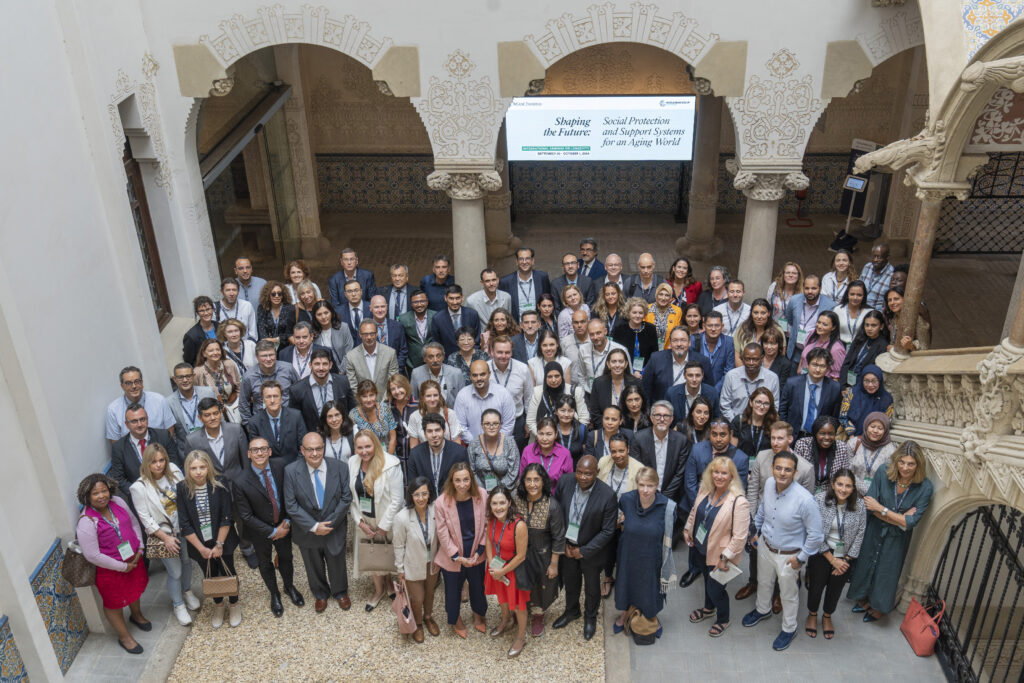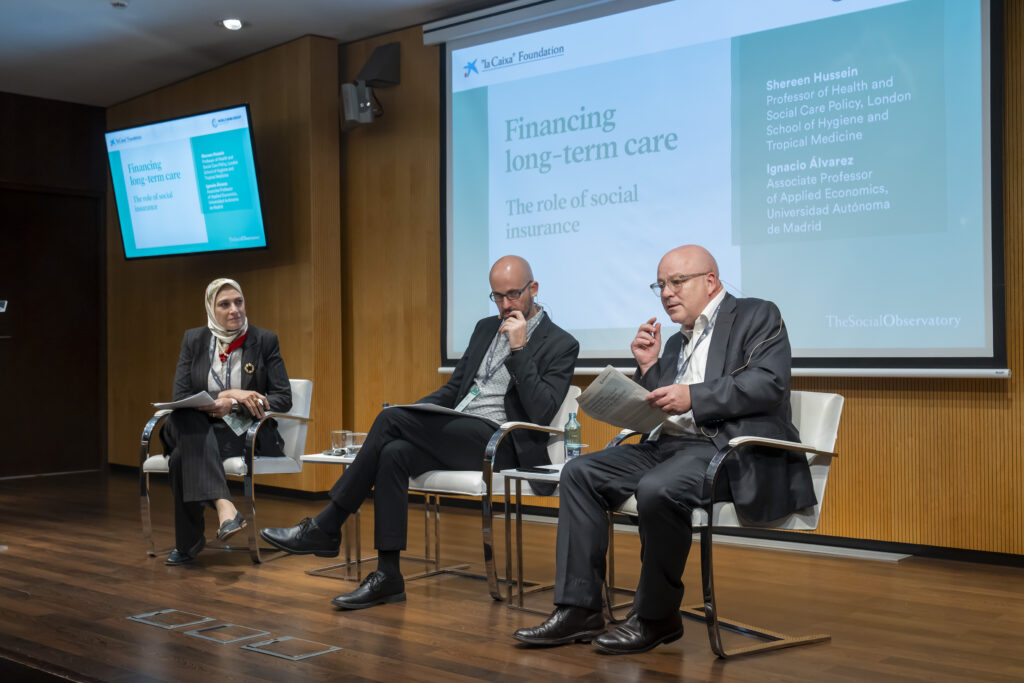The international seminar Shaping the Future: Social Protection and Support Systems for an Aging World was held from September 30 to October 1, 2024, in Barcelona, organized by the World Bank Academy and the Social Observatory of the ”la Caixa” Foundation. This seminar convened leading experts to discuss the global challenges arising from demographic shifts, especially the ageing population and its implications on social protection and long-term care (LTC) systems. A key contributor to these discussions was Professor Shereen Hussein of the London School of Hygiene and Tropical Medicine and Founder of MENARAH Network, who delivered a keynote speech and moderated a critical conversation on LTC financing.
The Seminar: Context and Objectives
As global life expectancy increases and fertility rates drop, nations are grappling with the complexities of supporting ageing populations. For many countries, particularly those with limited resources, the challenges associated with ageing populations — such as rising healthcare demands, social service strains, and financial sustainability — are becoming more urgent. Migration is seen as both a challenge and an opportunity, with the potential to offset some of the burdens of ageing societies.
The seminar aimed to share insights and strategies for managing these demographic changes, focusing on critical areas such as healthcare, financial inclusion, labour market adaptation, and, notably, long-term care. The sessions explored how countries can strengthen their LTC systems, ensure sustainable financing, and develop a skilled workforce to meet the needs of the ageing population.

Professor Hussein’s Key Contributions: Long-Term Care Models and Financing
Professor Hussein’s participation was multifaceted, reflecting her deep expertise in the long-term care sector. Her keynote speech, “Long-Term Care Challenges: What Works, What Has Failed, and What Needs to Be Reformed,” provided a comprehensive overview of LTC models globally, emphasizing both their diversity and the lessons that can be drawn from different approaches.
- The Diversity of Long-Term Care Models: In her keynote, Professor Hussein explored various LTC models implemented in different high and middle-income countries, from highly centralized systems in Scandinavian countries to more family-reliant structures in Eastern Europe. She highlighted the importance of understanding the trade-offs between state, market, and family roles in providing care and how countries can adapt these models to suit their specific demographic and economic conditions.
- Long-Term Care Workforce: One of the most pressing issues Hussein addressed was the growing demand for a skilled LTC workforce. She noted that while the LTC sector is expanding rapidly, it faces significant challenges, including low pay, difficult working conditions, and high levels of burnout. This results in difficulties in recruitment and retention of workers. Moreover, the distinction between professional and direct care workers and the large number of informal caregivers was a focal point in her analysis of workforce needs and reforms.
- Funding Models and Trade-offs: Hussein’s discussions on LTC funding touched on the trade-offs that governments must navigate, such as balancing public and private sector involvement, determining eligibility for care services, and reliance on family-based care systems. She noted examples from Germany’s long-term care insurance system and the cooperative models in Japan, which have evolved to meet the needs of their ageing populations.
- Opportunities and Future Directions: Beyond the challenges, Professor Hussein’s presentation was forward-looking, identifying areas for innovation in LTC. She stressed the role of digital literacy, community participation, and inclusive care systems in supporting independent living for elderly populations. Hussein also called for a paradigm shift, urging policymakers and stakeholders to move from a crisis management mindset to one of opportunity creation within the aging society. This involves leveraging knowledge across countries, fostering cross-sector collaborations, and embracing technological advancements.
In addition to her keynote, Professor Hussein moderated a crucial session on “Financing Long-Term Care: The Role of Social Insurance,” which included contributions from prominent experts like Philip O’Keefe, Professor of Practice and Director of the Ageing Asia Research Hub at the Centre of Excellence in Population Ageing (CEPAR), and Ignacio Álvarez, Associate Professor in Applied Economics at the Autonomous University of Madrid.

During the session on LTC financing, discussions centred on how countries can create sustainable financial models to support long-term care. Professor Hussein facilitated an engaging discussion, drawing on the experiences and expertise of her panellists.
- Philip O’Keefe brought his vast experience working with the World Bank, where he led policy dialogues and operations related to social protection and ageing across Asia and Europe. He discussed the importance of integrating social protection systems with LTC and highlighted the need for innovative financial models, such as long-term care insurance, to meet the growing service demand.
- Ignacio Álvarez provided a detailed perspective on Spain’s long-term care reforms, sharing how the Spanish government significantly increased its LTC funding during his Secretary of State for Social Rights tenure. He underscored the importance of government investment in LTC systems, particularly during the COVID-19 pandemic, which highlighted vulnerabilities in residential care facilities. Spain’s rapid increase in LTC funding, from €1.3 billion in 2020 to €3.3 billion in 2023, was a key part of his reforms to strengthen the country’s LTC system.
MENARAH Network’s Role in Advancing Long-Term Care
As a key figure in the MENARAH network, Professor Hussein’s work is pivotal in promoting the development of sustainable and inclusive LTC systems, particularly in the MENA region. The seminar reinforced the network’s commitment to fostering collaboration across countries and regions to address common challenges in aging populations and long-term care.
The MENARAH network continues to advocate for policies that support ageing populations, with a focus on integrated care models, workforce development, and sustainable financing mechanisms. Professor Hussein’s contributions at the seminar align with these goals, offering valuable insights that will shape the future of long-term care not only in the MENA region but globally.
Founder and Director
Shereen Husseinis a Health and Social Care Policy professor at the London School of Hygiene and Tropical Medicine (LSHTM), United Kingdom.
Shereen Founded the MENARAH Network in 2019, through an initial grant from the Global Challenge Research Fund, UKRI. She is a medical demographer with expertise in ageing, family dynamics, migration and long-term care systems. Shereen regularly collaborates with the United Nations, the World Health Organisation and the World Bank in policy and research focused on ageing in the Middle East and North Africa Region.
Shereen received her undergraduate degree in statistics and a postgraduate degree in computer science at Cairo University. She completed an MSc in medical demography at the London School of Hygiene and a PhD in quantitative demography and population studies at the London School of Economics and Political Science, United Kingdom.



